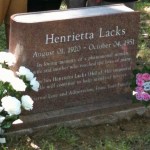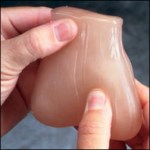cancer
(NOTE ADDED 12/7/2010: Kim Tinkham has died of what was almost certainly metastatic breast cancer. Also note that, when it was publicized on the Internet and on the blogosphere that Tinkham's cancer gave every indication of having recurred and she was dying, her "practitioner" Robert O. Young removed the videos embedded below from YouTube.)
Remember Kim Tinkham?
She's the woman who was diagnosed with Stage III breast cancer about three years ago. At the time, she became infamous because she showed up on Oprah Winfrey's show, back when Oprah was in her "Secret" phase and proceeded to alarm…
Mark Pendergrast writes: To kick off this book club discussion of Inside the Outbreaks, I thought I would explain briefly how I came to write the book and then suggest some possible topics for discussion.
The origin of the book goes back to an email I got in 2004 from my old high school and college friend, Andy Vernon, who wrote that I should consider writing the history of the EIS. I emailed back to say that I was honored, but what was the EIS? I had never heard of it. I knew Andy worked on tuberculosis at the CDC, but I didn't know that he had been a state-based EIS officer from 1978…
In the wake of President Obama's election, there was a great deal of hope that he would take science-based medicine seriously and, as he promised in his inaugural speech, "restore science to its rightful place." Shortly before Obama's inauguration, in fact, Steve Salzberg proposed that the Obama administration should defund the National Center for Complementary and Alternative Medicine (NCCAM).
NCCAM, as you may recall, is a center in the National Institutes of Health largely dedicated to funding pseudoscience. True, there is some legitimate research mixed in with the pseudoscience, but it's…
Back in the 1990s when I first dipped my toe into the pool that was Usenet, that massive, wild, and untamed frontier where most online discussion occurred before the rise of the web and later the blogosphere, I was truly a naif. I had no idea--no inkling--of the depths of quackery to which people would sink. If Usenet was my bootcamp that opened my eyes to the seemingly endless varieties of quackery and, in particular, the flavor of quackery that represents anti-vaccine lunacy and "biomedical treatments" for autism, then my graduate education in the battle for science-based medicine began in…
I think the message may finally getting through.
That message is that it's not always the best strategy to treat cancer aggressively. Don't get me wrong. If I have acute leukemia, I know I'll need the big guns, every bit of chemotherapy appropriate to the disease that modern oncology can throw at it up to and including a bone marrow transplant. But what about prostate cancer? Breast cancer? Thyroid cancer? It turns out that more treatment isn't always better for these diseases, depending on the subtype, and in some cases, such as early stage prostate cancer of low aggressiveness, it is quite…
I've had the immense good fortune to have trained and ultimately become a physician-scientist during a time when the pace of discovery and the paradigm changes in science have occurred just over the course of my career in medicine and science has been staggering. microRNA, the shift from single gene studies to genomics, the development of targeted therapies, the completion of the Human Genome Project, these are but a few examples. Of course, arguably the Human Genome Project is the granddaddy of all of the huge changes and paradigm shifts that has occurred to revolutionize biomedical research…
Let's see. Now that I'm back from Chicago, having recently attended a major cancer meeting, not to mention having already blogged about the meeting, what to do next? Sure, the whole thing about Andrew Wakefield finding himself just one step away from appearing on Jeff Rense's or Alex Jones's radio show was amusing in the extreme to me, and no doubt there will be much more blogging material to mine in that vein, but if you really want to bring home the crazy there's only one place shy of Whale.to to visit.
That's right, I'm talking about that wretched hive of medical scum and villainy, Mike…
Homer alert.
The title pretty much covers three of some of my favorite things about living in Durham, NC. From the Pharmboy mailbox and Durham Magazine website:
Catherine Clabby - former reporter extraordinaire for The News & Observer, current editor extraordinaire for American Scientist magazine and a long-time Durhamite extraordinaire - spent hours finding out why The State of Things host Frank Stasio has fallen head-over-heels for Durham. Sometimes it takes an outsider to help us all appreciate how good we have it. Frank's doing that in a big way, both through his work at NPR and in…
Well, I'm home.
As I've mentioned before, I attended the annual meeting of the American Society of Clinical Oncology (ASCO) in Chicago. Although one of the problems with ASCO, at least for surgeons like me, is that it is a meeting completely dominated by medical oncology. Quite frankly, not that much of what is presented at ASCO has a lot of relevance to my surgical practice. There are exceptions, of course. In fact, Monday morning's sessions on breast cancer were the best of science-based medicine that will change practice. Perhaps I'll blog about that tomorrow or later in the week. As I…
Just the other day, I wrote about how DrugMonkey and I have experienced unprecedented and sustained blog traffic for posts we wrote in February on K2 Spice, one of a couple of marijuana-like "incense" products still sold legally in the United States.
Every morning, I dial up my SiteMeter blog statistics and take a look at what posts readers first land upon when coming to visit the humble world headquarters of Terra Sigillata.
Last week, 2,700 to 2,800 of the 4,000 most recent hits were landing on our February K2 Spice post. (You will also note below the sad state of my readership in that…
In addition to my own photos herein, Tom McLaughlin posted a nice slide show of the day at his South Boston News & Record.
Despite two trees that snapped and fell in my driveway within six feet of my car in an impressive thunderstorm Friday evening, I drove on Saturday morning to Clover, Virginia, for the dedication of a gravestone that finally marks the final resting place of Henrietta Lacks, a concrete honor, if you will, to recognize the source of one of the most valuable medical tools of the 20th century and today.
For those who are not regular readers, Henrietta Lacks was a rural…
By Elizabeth Grossman
If the recommendations of the just published President's Cancer Panel report, Reducing Environmental Cancer Risk: What We Can Do Now, become part of a comprehensive national policy agenda, the United States will have a remarkable new cancer prevention strategy - one that includes aggressive efforts to reduce and eliminate chemical exposures that can lead to and cause cancer, including those in the workplace.
Released on May 6th , the report (which includes over 450 sources) is remarkable for its embrace of environmental health science research that has not yet been…
Around this time last year, the major topic of this blog was the case of a young teen named Daniel Hauser. In fact, right around this time last year, this particular case was approaching its climax. Hauser, as you may recall, was the 13-year-old Minnesota boy diagnosed with Hodgkin's lymphoma who refused chemotherapy. His stated reason was his religion, namely Nemenhah, a fake American Indian religion that his parents joined 18 years ago. However, I had my doubts that religion was the main reason why Hauser was refusing chemotherapy and his mother was supporting his decision to pursue "…
Here we go again.
I've written a few times before about the controversy over whether cell phones (a.k.a. mobile phones in most of the rest of the world) cause brain cancer, concluding on more than one occasion that the evidence does not support a link. For example, there has not been a large increase in brain cancer or other cancers claimed to be due to cell phone radiation in the 15 to 20 years since the use of cell phones took off back in the 1990s, nor has any study shown a convincing correlation between cell phone use and brain cancer.
Of course, one would not expect a priori, based on…
As a followup to my rather "epic post" on dichloroacetate, I thought I'd just post a brief follow up. A reader sent me this video of Evangelos Michelakis, the investigator who has been testing DCA in the clinic and who did the study testing DCA against gliblastoma, describing his results:
It's always interesting to hear research results "straigh from the horse's mouth, so to speak."
From the Department of Sensible Things That Are Still Quite Funny comes these life size testicles, made with BIOLIKE⢠synthetic tissue. Now you can fondle your balls in public without fear of prosecution! Yours for just $115.
One happy customer reports:
One of the best purchases that I've ever made! Several of my co-workers have thanked me for bring them in and sharing. I'm so glad to have them, then one model is attached to the rear view mirror on my VW Beetle. All I can say is stop playing around and get this real deal!
The only downside is that there are two synthetic tumours embedded…
Late last week, a crank I hadn't heard from in a while showed up in my comments. I'm referring to DaveScot, who normally was known for promoting anti-evolution rhetoric in the service of the pseudoscience known as "intelligent design" creationism. This is what he said:
Hi Orac,
terrasig suggested you do a followup article on dichloroacetate (DCA) given the paper just published on the phase 1 trial in Edmonton.
Three years have passed and countless cancer patients were denied this drug. Now at the end of its first phase one trial we know exactly what we did from the reports of people self-…
Dichloroacetate or DCA is a small molecule that has been in the press over the last four years due to its potential to inhibit aerobic glycolysis in cancer cells. The cells from each of us usually produce energy in the form of ATP from a variety of nutrient sources plus oxygen using a very efficient process called oxidative phosphorylation. However, when oxygen is partly depleted, such as in skeletal muscle when exercising strenuously ("going anerobic"), energy is produced from glucose by a far less efficient process called glycolysis. Glycolysis is the most primitive form of cellular…
In yesterday's post, in which I discussed the President's Cancer Panel report on environmental toxins and cancer, I criticized one of the reactions to it, specifically that of the American Council on Science and Health (ACSH), even referencing a truly hilarious Daily Show clip in which Jeff Stier, Associate Director of ACSH didn't exactly come off looking particularly good. (Let's just leave it at that.) Apparently my criticism didn't sit too well with Gilbert Ross, MD, the Medical/Executive Director of ACSH, because he actually showed up in the comments, apparently wounded that I would point…



